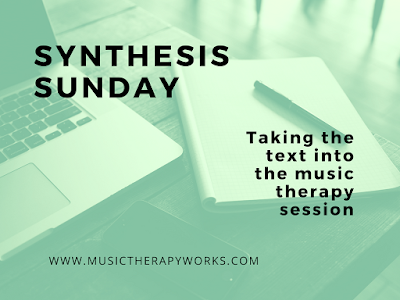Synthesis Sunday: Chapter 12 of Music Therapy in Context: Music, Meaning and Relationship
I am almost finished with reading my current music therapy text. I have one chapter left after this one, and I am looking forward to the end of the book. It has really enriched me and my understanding of improvisation and music therapy.
Having said that, I want to share that I had lots of difficulty with understanding and even liking this particular chapter, Psychodynamic meaning in music therapy.
Full disclosure here.
I am not a psychodynamic music therapist. I was "raised" in a behavioral context as a music therapist, trained as a sensory integrative therapist, and have decided upon humanism as my primary philosophical view. I don't recall anyone ever saying anything mean, inaccurate, or degrading about folks who are psychodynamic or psychoanalytical in nature during my educational processes, but I've never felt comfortable with the entire set up.
I went into the chapter, trying very hard to figure out what was being said. I kept getting caught up in the verbal nature of this form of music therapy - the emphasis on verbal processing either with the client or on the part of the therapist. I had to stop several times to argue with what I had read in the chapter.
"Does music therapy HAVE to include verbal processing?" "If so, why?"
Does this viewpoint explain the nasty interactions I've had over the years with those who do practice psychodynamic music therapy and who belittle the training and philosophy of others? I've been told that "special education music therapy cannot really be called music therapy." I've been told that I, being a behaviorist, "cannot truly respond to my clients within the music."
I try really hard to acknowledge that therapists who practice within different philosophical and theoretical foundations practice differently - not better or worse - just differently. I think there is a place for psychodynamic music therapy, but I also think there is a place for behavioral and humanistic music therapy. All of the forms of music therapy out there are important for someone or they wouldn't have been developed to begin with.
I think my history with people and their attitudes really colored my interpretation of this chapter.
I did glean some interesting thoughts from this chapter, when I got out of my own way and translated some concepts into my music therapy structure, context, and philosophy.
"We have seen that clinical improvisation reveals dynamic forms of feeling: clinical improvisation reveals the essence of how the person is in the world, although the relationship is created by both players. The music is not about the person, it is the person." - Gary Ansdell (p. 161 in Pavlicevic, 1997).I can see this without any type of paradigm shift, but I wonder if this is true in a behavioral session. I was always trained that it was not appropriate to presume or assume that the therapist would know what someone else was thinking or reasons behind the way music was offered without client assertions. I can see, though, patterns of behavior that my clients have displayed over the years that did indicate their ways of relating to their worlds. I know when a client finally becomes comfortable with me as a therapist - their music shifts subtly. I can tell when someone is feeling ill - again, their music changes. My objective mind tries not to assume anything, but assumptions do occur in the music therapy session - it can't be helped, I think. What I do is acknowledge the assumptions and then check to see if my thoughts are true. Sometimes they are, often they are not.
I do think that I finally understand the concepts of transference and counter-transference, thanks to reading this chapter. Ms. Pavlicevic has a way of explaining things that makes concepts clear to me.
I also have several new names to exam in my quest for knowledge - Diaz de Chumaceiro, Patrick Casement, Harry Guntrip, David John - all names that are unfamiliar to me.
That's the thing about reading, it always leads to more reading!
I am looking forward to the last chapter - Ms. Pavlicevic titled this one, Why do we become therapists? I am looking forward to her reasoning and discussion about all of this.
If you are still reading these posts, thank you for going on this journey with me. I'd be interested to know what others think about this text and about what Ms. Pavlicevic says about music, meaning, and relationship. If you haven't read this book, I would recommend it, specifically if you are interested in a text which offers some ideas about why improvisation is such a powerful tool in the music therapy setting.
Happy Sunday, all!
Pavlicevic, M. (1997). Music therapy in context: Music, meaning and relationship. London: Jessica Kingsley.


Comments
Post a Comment